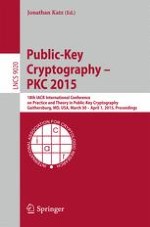
2015 | OriginalPaper | Buchkapitel
Simulation-Based Selective Opening CCA Security for PKE from Key Encapsulation Mechanisms
verfasst von : Shengli Liu, Kenneth G. Paterson
Erschienen in: Public-Key Cryptography -- PKC 2015
Verlag: Springer Berlin Heidelberg
Aktivieren Sie unsere intelligente Suche, um passende Fachinhalte oder Patente zu finden.
Wählen Sie Textabschnitte aus um mit Künstlicher Intelligenz passenden Patente zu finden. powered by
Markieren Sie Textabschnitte, um KI-gestützt weitere passende Inhalte zu finden. powered by
We study simulation-based, selective opening security against chosen-ciphertext attacks (SIM-SO-CCA security) for public key encryption (PKE). In a selective opening, chosen-ciphertext attack (SO-CCA), an adversary has access to a decryption oracle, sees a vector of ciphertexts, adaptively chooses to open some of them, and obtains the corresponding plaintexts and random coins used in the creation of the ciphertexts. The SIM-SO-CCA notion captures the security of unopened ciphertexts with respect to probabilistic polynomial-time (ppt) SO-CCA adversaries in a semantic way: what a ppt SO-CCA adversary can compute can also be simulated by a ppt simulator with access only to the opened messages. Building on techniques used to achieve weak deniable encryption and non-committing encryption, Fehr
et al.
(Eurocrypt 2010) presented an approach to constructing SIM-SO-CCA secure PKE from extended hash proof systems (EHPSs), collision-resistant hash functions and an information-theoretic primitive called Cross Authentication Codes (XACs). We generalize their approach by introducing a special type of Key Encapsulation Mechanism (KEM) and using it to build SIM-SO-CCA secure PKE. We investigate what properties are needed from the KEM to achieve SIM-SO-CCA security. We also give three instantiations of our construction. The first uses hash proof systems, the second relies on the
$$n$$
-Linear assumption, and the third uses indistinguishability obfuscation (
$$i\mathcal {O}$$
) in combination with extracting, puncturable Pseudo-Random Functions in a similar way to Sahai and Waters (STOC 2014). Our results establish the existence of SIM-SO-CCA secure PKE assuming only the existence of one-way functions and
$$i\mathcal {O}$$
. This result further highlights the simplicity and power of
$$i\mathcal {O}$$
in constructing different cryptographic primitives.